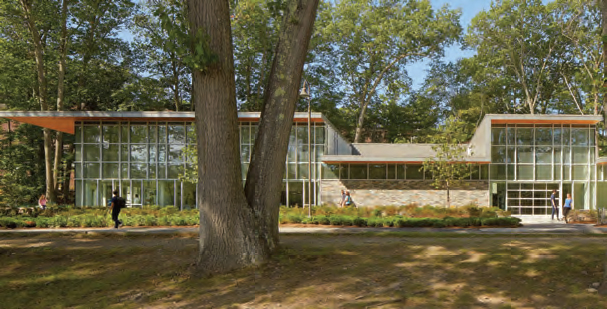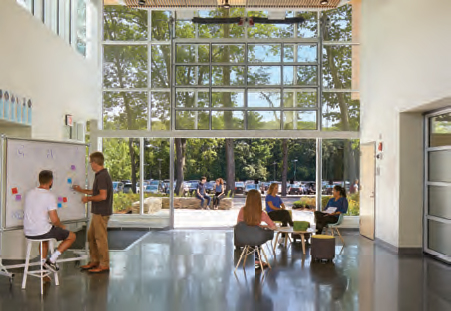
Photo: Bruce T. Martin
The new Weissman Foundry, which gives Babson, Olin, and Wellesley college students a space to build, collaborate, and explore ideas, is now open.
The 10,000-square-foot studio offers a range of workspaces for making anything from furniture to food, machines to movies. Access to hand tools, digital fabrication equipment, robotics, virtual- and augmented-reality technology, and more will be provided to students. Located on Map Hill Drive and named for Babson trustee Robert Weissman ’64, H’94, P’87, ’90, and his wife, Jan Weissman, P’87, ’90, the Foundry is open 24 hours a day, seven days a week, making it available to students to work—and get feedback from others—whenever inspiration strikes.
“The goal is to create a place where creativity and inspiration can not only happen, but be taught and learned and implemented into ideas for all three schools,” explains Janos Stone, the new Foundry’s manager of innovation and design spaces.
Stone is no stranger to hands-on creativity. A graduate of the Rhode Island School of Design, Stone is a designer and sculptor whose work has been shown in New York City and internationally. He has taught design at the university level and founded or co-founded three companies, all built around “helping people use their inherent creativity to create a better environment or products for themselves,” he says. He is currently launching a fourth company, which makes kids’ minimalist playhouses constructed of corrugated plastic using “thick origami” techniques. Stone plans to use the same principles to create privacy screens in crowded refugee camps.
Soon after he was hired in the summer, Stone set to work hiring an equal number of students from Babson, Olin, and Wellesley to staff the foundry. He calls these employees “scouts,” with the idea that they support Foundry visitors in their creative processes. The goal is to ensure that the Foundry has a “nurturing, exploratory environment” that frees people to think in fresh ways.

Photo: Bruce T. Martin
Stone and the scouts gather at 5:30 on Monday evenings for regular meetings called “campfires.” “Those meetings are open to anybody, including faculty and students from any of the three schools,” Stone explains. The campfires give all a chance to discuss current and future projects or propose new programs and events.
Stone is encouraging Foundry users to think like artists and push boundaries. “That’s going to make better entrepreneurs,” Stone says. “The end result is people who are more creative in their thinking, who can develop better business models and better solutions, and who can take what they’re working on and make it more functional and valuable.”—Erin O’Donnell is a freelance writer in Milwaukee.
